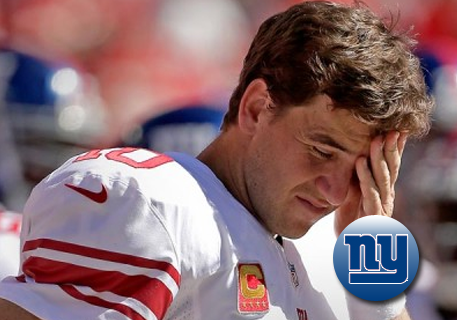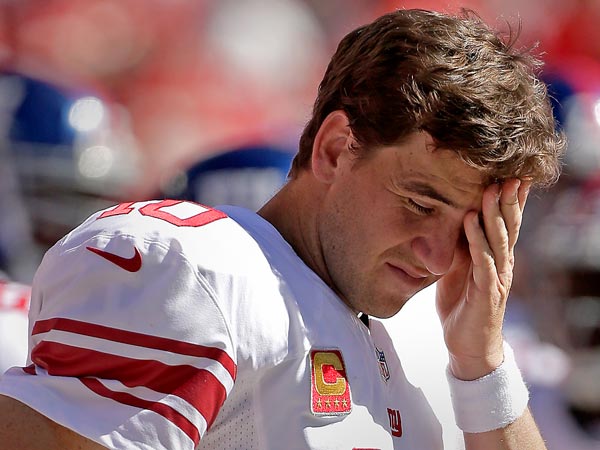On 28 July, Giants quarterbacks coach Danny Langsdorf told reporters that he wants Eli Manning to reach a completion rate of 70% this season. This comment drew snorts of derision more than it did raise eyebrows or prompt any kind of serious discussion. Six days later, Eli set about proving all the critics wrong; finishing a game with a completion rate of 85.7%. Of course, it was only the preseason-opening Hall of Fame Game. And he only attempted seven passes. It may be slightly more difficult when Eli takes the field in Week 1 in Detroit against Ndamukong Suh and the swarming Lions defensive line. But, still, baby steps.
The incredulity that dismissively enveloped Langsdorf’s comments was not without a sound basis. After all, Eli’s completion percentage last year was 57.5%. His highest ever completion percentage was 62.9% in 2010 and his career average is 58.5%. Given that Eli is entering into his eleventh season in the NFL, it does seem difficult to fathom quite how he is expected to make that dramatic a leap in efficiency.
Even big brother Peyton has never managed to reach 70% for a season; his best being 68.8% with the Colts in 2010. That’s right, even during his two incredible record-breaking seasons with the Broncos, Peyton’s completion rate since 2012 has ‘only’ been 68.45%. The Everest 70% number has only been attained five times in NFL history and the only active player to have scaled that peak is Drew Brees (who has done so twice).
But this is not about Eli suddenly emulating Drew Brees. If Manning is to reach anywhere close to 70% it will not be by the same means. This is about the appointment of Ben McAdoo as the new offensive coordinator from the Green Bay Packers and the implementation of the West Coast offense.
If we want a more useful comparator for Eli’s potential development then we need look no further than Phillip Rivers. Rivers and Manning will forever be linked historically by the events of the 2004 draft. San Diego had the first overall pick but Manning publicly stated that he would refuse to play for the Chargers if they drafted him. The Chargers did just that but had a deal in place with the Giants whereby Rivers ended up in San Diego and Eli in New York.
Last season the Chargers brought in Mike McCoy as head coach and Ken Whisenhunt as offensive coordinator. Together, they deployed a new offense that emphasised the short-area passing game and rarely targeted wide receivers. In fact, wide receivers accounted for only 47.1% of pass attempts, with 27.7% going to tight ends and 25% to running backs. They were one of only three teams to throw more passes to non-wide receivers than wide receivers. The result was one of incredible efficiency. Throughout the entire season, the Chargers had only 56 punts and 21 turnovers. As for Phillip Rivers, he had a personal best, and league leading, completion percentage of 69.5%.
Could a similar change in philosophy translate to equivalent success for Eli Manning? It will take a lot of work. The Giants did not spread their pass attempts quite as evenly last season, with 64.6% of passes being thrown to wide receivers (the sixth highest in the NFL).
The Chargers were the beneficiaries of intensely efficient seasons from Danny Woodhead and Keenan Allen. They also had the reliable Antonio Gates and a running game that featured Ryan Matthews. Matthews led the league in carries in December yet the Chargers were still ranked first in the NFL in percentage of runs not tackled at or behind the line of scrimmage (i.e. ‘stuffed’ runs).
All of this led to the perfect storm in San Diego last season and it will be difficult to replicate the same conditions for the Giants, not least because of the imperfect weather in New York come December. The wind and cold provide an additional layer of defense against which Eli will have to navigate.
Then there is the issue of personnel. There is no Antonio Gates at the tight end position and as exciting as Odell Beckham Jr. might be, he is still a rookie. He joins a wide receiver crew that includes Victor Cruz and Mario Manningham, but is depleted by the loss of Hakeem Nicks. As for the running game, the Giants were 29th in the league last season. It was thought that the 23-year old David Wilson could help them bounce back but then he was forced to retire earlier this week due to a neck injury. Enter rookie Andre Williams and Rashad Jennings. Jennings is likely the starter in Week 1, a relatively unfamiliar role for him in his five seasons in the NFL, and in 2013 he amassed only 10.9 rushing attempts per game and 36 total receptions in 15 games for the Raiders.
So Langsdorf’s comments may not be crazy, but they remain exceedingly optimistic. If nothing else, expect Eli Manning’s efficiency to increase and we should see a significant improvement from his league leading (by some distance) 27 interceptions in 2013. Such improvement would put the Giants back in playoff contention and this is all that really matters. As completion percentages plummet along with the temperature in the postseason, this is when Eli Manning shines. As long as he is given an opportunity to ply his trade in late January/early February, then the difference between 65-70% will seem pretty negligible. It is a difference that Langsdorf and McAdoo will be quick to forgive.
By Ognjen Miletic





